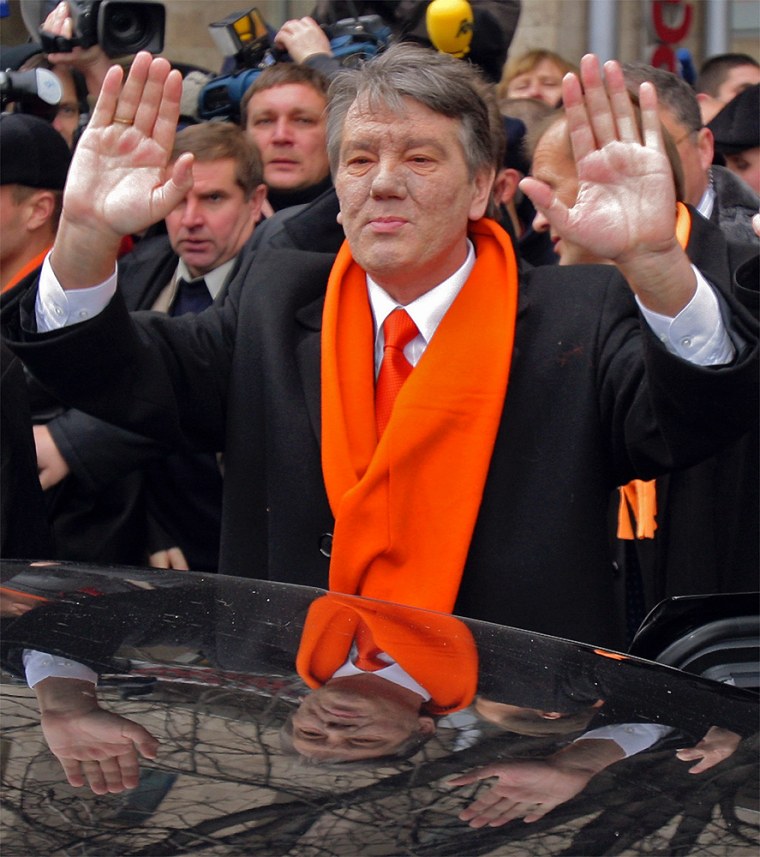Opposition leader Viktor Yushchenko said Friday he would prosecute government officials and their supporters for crimes committed during the last decade should he win Ukraine’s repeat of the presidential election Dec. 26.
Yushchenko, meanwhile, arrived later Friday at a private Austrian hospital for tests to determine the cause of the mysterious illness that has disfigured his face.
Crackdown on corruption
In his first news conference since parliament voted to grant key electoral changes aimed at averting fraud, Yushchenko said n Kiev before leaving for Vienna that the killing of journalist Hrihoriy Gongadze was an example of a crime that would not go unpunished should he be elected. President Leonid Kuchma has denied involvement in the case.
“I have a moral obligation to Gia,” Yushchenko said, using the journalist’s nickname. “Those guilty will be prosecuted — not only this, but other important cases.”
With the momentum of more than two weeks of street protests behind him, a confident Yushchenko pledged not to engage in purely political retaliation against his opponents should he win.
Yushchenko spoke as the two sides started mapping out their campaign strategies for the repeat of the Nov. 21 runoff. The Supreme Court threw out Yanukovych’s victory in that runoff, saying it was invalidated by fraud. The measure also handed over some presidential powers to the parliament.
In other developments:
- Russian President Vladimir Putin, who backs Yushchenko’s opponent, Prime Minister Viktor Yanukovych, said Moscow had no objection to Ukraine’s joining the European Union. The comments were in marked contrast to several weeks of harsh rhetoric from Putin, who has warned the West not to meddle in Ukraine’s election crisis.
- Yanukovych’s native Donetsk region agreed to cancel a referendum on self-rule planned for early January. In a joint statement, Donetsk and other eastern provinces that supported Yanukovych in the runoff promised to abstain from such plans, which stoked fears of the country’s breakup.
- Kuchma named a new prosecutor general, Svyatoslav Piskun. He replaces Hennady Vasylyev, who was accused by Yushchenko’s supporters of covering up election fraud.
Mystery of illness deepens
Arriving at the Rudolfinerhaus clinic Friday in Vienna, Yushchenko said he would stay until Monday, unless tests were finished before then.
Yushchenko, 50, first fell ill in September and was rushed to the Vienna hospital. He resumed campaigning later in the month but with a pockmarked and badly disfigured face. He has accused Ukrainian authorities of trying to poison him ahead of the election, an allegation they have denied.
Yushchenko suffered from a series of symptoms, including back pain, acute pancreatitis and nerve paralysis on the left side of his face. Earlier this week, doctors said they were testing several theories as to what caused the ailment.
Dr. Michael Zimpfer, director of Rudolfinerhaus, said that they were “investigating the hypothesis of poisoning.”
“However, we have not found any indication that a chemical or biological substance has been employed. Also, we are following new threads, and [we have] included other labs to do more specific testing,” he said this week.
Doctors have only “a descriptive diagnosis” but no proof of what led to the ailments, Zimpfer said, adding that they could have had internal causes or have been sparked by a poison.
Blockades removed
The opposition, meanwhile, continued dismantling its blockades of government offices following the parliament’s passage of the electoral changes Yushchenko had demanded.
A few dozen protesters maintained a vigil outside the president’s office. More protesters milled around the tent city set up by Yushchenko’s supporters along the city’s main avenue, but thousands of their comrades returned to their homes, schools and offices after spending more than two weeks in street protests.
“The revolution is far from over, but some simply had to go back to work,” said Vyacheslav Godunyk, a clerk from Kiev. “We can be back on streets in minutes.”
Only a handful of protesters remained in place after barricades were dismantled Thursday outside the gray, Stalin-era Cabinet building. The blockade, an opposition tool to keep up pressure on the government, had kept top officials from reporting to work.
“This is a sad and happy day at the same time,” said Oleksiy, a protester who gave only his first name. “We endured more than two weeks and now we are leaving, but we are leaving as winners.”
A blockade near the president’s office remained in place, but Roman Zvarych, a member of Yushchenko’s campaign staff, said he believed it, too, would soon be removed.
